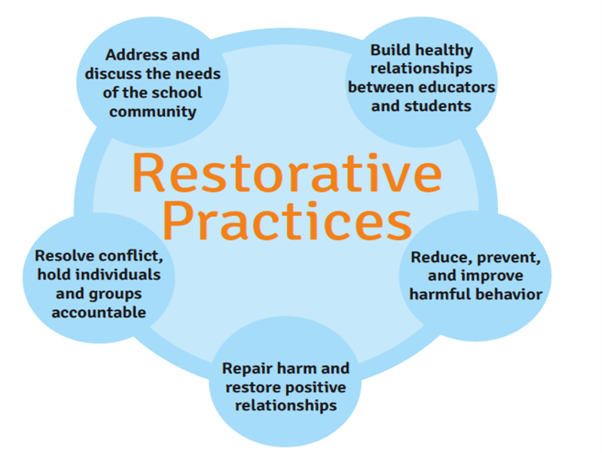What is Restorative Practice?
Restorative practice is a value based philosophy rooted in fairness and respect for human beings. It aims to build relationships and promote empathy. Taking a restorative approach place high expectations on the community, but also offers high levels of support to ensure those expectations are reachable. A particular set of skills are taught to ensure the restorative approach is actively used in our school. Those skills include; the ability to listen, develop empathy between people, being fair and problem-solving skills. Such skills, alongside our emphasis on respect, allow us to build relationships which will reduce the possibility of conflict, however if conflict is to occur, restorative practice offers a way to resolve conflict and hold those responsible accountable, while allowing them to reintegrate into the school community in a restorative manner.
What Restorative Practice looks like in our school?
Goatstown Educate Together Secondary School provides training each year for returning and new staff. We have a qualified Restorative Practice Trainer on staff who, each year, trains new tutors to ensure the pastoral care of students is caried out in a respectful, empathetic manner. Our staff like to model this approach to students. Students are educated on Restorative Practice during tutor time, informing them of its purpose in our school and how they can use it in their own personal life also. Students may engage in restorative conversations if conflict occurs and are invited to take a no-blame approach, while focusing on their own experience in attempt to resolve the conflict.
The Restorative Questions:
These six questions help a facilitator work from past to present, while giving participants a chance to take ownership of their behaviours and actions and drawing on empathy, in attempt to ensure the behaviours and actions are not repeated. Participants are encouraged to use ‘I’ statements.
1. What happened? (past; factual account)
2. What were you thinking about at the time? (past)
3. What have you thought about since? (present)
4. Who has been affected and in what way? (present; encourages empathy)
5. How could have been done differently? (present)
6. What do you think needs to happen next? (future)


